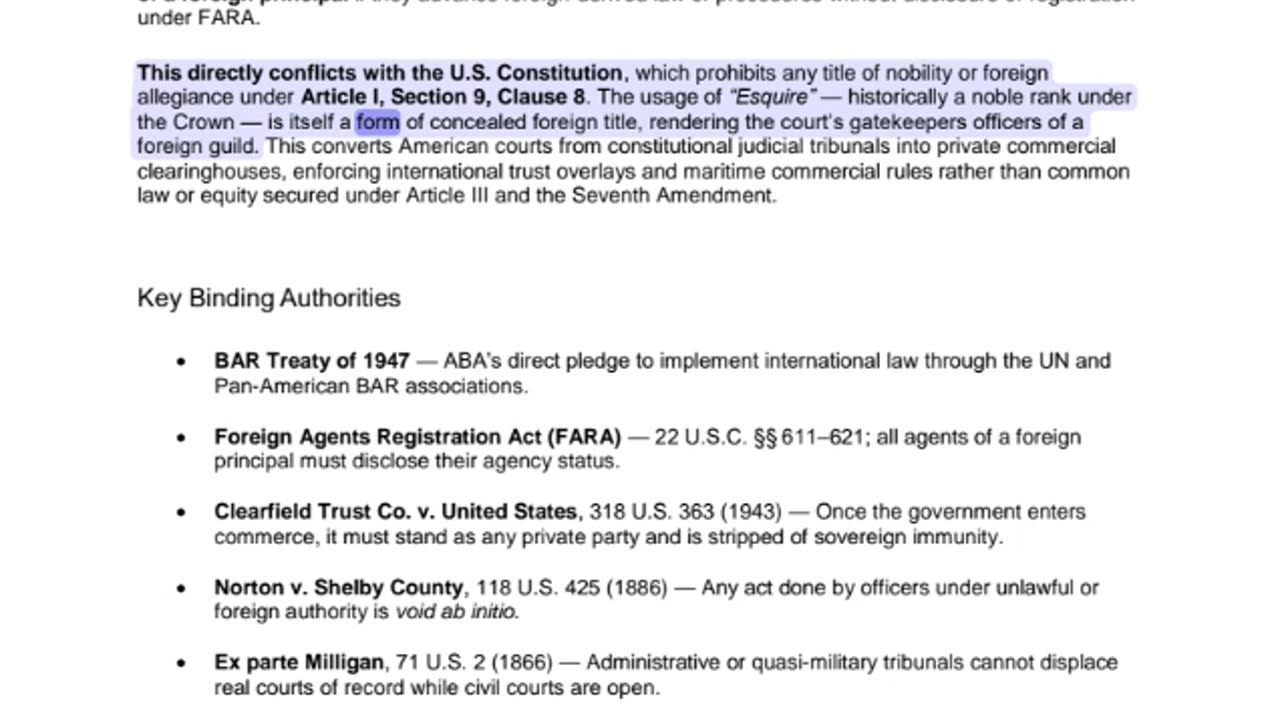Premium Only Content

Executive De Son Tort — Unauthorized Usurpation and Tortious Trespass
Foreign Principal Activity
Bar Guild & International Law Overlay
Context and Claim:
Courts in the United States, including South Dakota, are not operating purely under Article III constitutional or common law authority. Instead, they are functioning as administrative tribunals under a foreign guild system — the British Accredited Registry (BAR) — and under obligations to foreign compacts, treaties, and administrative codes such as the FARA (Foreign Agents Registration Act) and international legal associations.
Key Supporting Authorities & Frameworks:
1. BAR Treaty of 1947
• The Charter of the International Bar Association (IBA) was signed in 1947 in New York and London, aligning the legal guilds of the United States with those of foreign jurisdictions.
• The IBA is registered as a United Nations NGO, demonstrating its international, non-domestic scope.
• The American Bar Association (ABA), a private corporation, is a member of the IBA, linking all state bar associations — including the South Dakota Bar — to foreign legal standards and jurisdictions.
• Impact: Lawyers and judges licensed under BAR associations are foreign agents by international contract operating under a private, transnational legal system.
2. FARA – Foreign Agents Registration Act, 22 U.S.C. § 611
• Requires disclosure of those acting as agents of foreign principals.
• Attorneys under international BAR associations arguably act under foreign authority via the IBA/ABA/UN connection.
• If BAR members are not disclosing their foreign affiliations under FARA, they are operating without informed consent, violating public trust and transparency laws.
3. CFR & U.S. Code Definitions: “Foreign State”
• 22 CFR § 120.16 and 28 U.S.C. § 1603 define “foreign state” to include political subdivisions or agencies under international governance structures.
• Many BAR-controlled court operations are conducted administratively, not judicially, via foreign-enforced codes (e.g., UCC, Title 28, Title 26).
• Judges, clerks, and prosecutors, acting through these codes, are not enforcing common law, but administrative contract law under foreign agency protocols.
4. Municipal Bonds & DUNS/CAGE Codes
• Every courthouse and judicial district has a DUNS number and CAGE code, indicating their registration as commercial entities doing business with federal and international financial markets.
• These courts issue performance bonds, appearance bonds, and other sureties, which can be pooled and traded as securities, in violation of constitutional separation of powers and without proper disclosure.
5. United Nations Treaties and Obligations
• The U.S. is a party to numerous international covenants, including the UN Covenant on Civil and Political Rights (CCPR) and Universal Declaration of Human Rights (UDHR).
• Many court practices now reference international norms, subtly shifting authority from constitutional due process to administrative human rights models managed internationally.
• Courts enforcing these obligations are acting not as constitutional courts, but as international contract enforcement bodies.
6. Cruden v. Neale, 2 N.C. 338 (1796)
“Every man is independent of all laws except those prescribed by nature. He is not bound by any institutions formed without his consent.”
This foundational American case supports the idea that unless a living man or woman consents knowingly, voluntarily, and intentionally, they are not bound by foreign or administrative jurisdictions.
The presence of foreign principal activity via BAR associations, DUNS-registered courts, international treaty compliance, and commercial bonding practices proves that today’s courts are not Article III courts of record but rather foreign administrative venues. These operate under contract, insurance, and private commercial enforcement, often without disclosure, and therefore without valid constitutional authority.
Legal Maxim: “A delegated power cannot be greater than the original grant.” — If the People never granted the power to enter foreign contracts, then such authority is ultra vires — void from inception.
-
 LIVE
LIVE
Lofi Girl
3 years agolofi hip hop radio 📚 - beats to relax/study to
175 watching -
 12:19
12:19
BlabberingCollector
1 day agoPotter Fans In Frenzy, Keira Knightly Responds To Potter Involvement Backlash | Wizarding World News
2.09K -
 2:56:20
2:56:20
FreshandFit
11 hours agoThe Price Is Right! Fresh&Fit After Hours Edition
188K64 -
 6:45
6:45
The Power of Connection
2 days agoThe Power of Connection : Networking vs. Connecting
3.75K3 -
 28:53
28:53
Afshin Rattansi's Going Underground
3 days agoTrump Has Surrounded Himself With Neocons AGAIN, War After War is Coming! (James Carden)
13.7K12 -
 1:54:50
1:54:50
Badlands Media
10 hours agoDevolution Power Hour Ep. 398: Economic Warfare, Trump’s Strategy, and the Coming Reckoning
67.6K29 -
 2:08:19
2:08:19
Inverted World Live
8 hours agoInvasion of the Lectern Guy | Ep. 124
48.5K4 -
 2:54:29
2:54:29
TimcastIRL
8 hours agoDemocrats Declare STATE OF EMERGENCY Over ICE Raids, DHS ATTACKED, CIVIL WAR | Timcast IRL
245K143 -
 2:37:25
2:37:25
TheSaltyCracker
8 hours agoAlex Jones Gets Screwed ReeEEStream 10-15-25
105K262 -
 58:25
58:25
Man in America
12 hours agoPaper Silver IMPLODES: Experts Predict HUNDREDS PER OUNCE is Coming
45.6K25